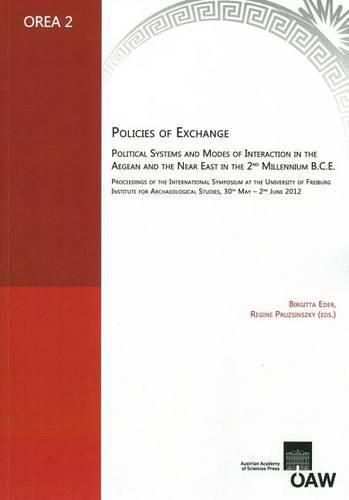Readings Newsletter
Become a Readings Member to make your shopping experience even easier.
Sign in or sign up for free!
You’re not far away from qualifying for FREE standard shipping within Australia
You’ve qualified for FREE standard shipping within Australia
The cart is loading…






The Late Bronze Age in the Eastern Mediterranean belongs to the most captivating chapters in the history of the Ancient World: Various cuneiform documents and archaeological sources illustrate the numerous contacts between different polities in the 2nd millennium BCE. Reciprocal gift exchange within the framework of diplomatic contacts and redistributive mobility of goods in asymmetric political relations shaped regional and supra-regional communication in different ways. Following the detailed discussions about modes of culture contacts and exchanges in previous research the contributions in the present volume address questions of the specific mechanisms and routes of exchange. How and by which means did material commodities and knowledge circulate among the Great Powers, lesser independent states and vassal kingdoms of the Aegean, Anatolia, Syria, the Levant, Mesopotamia and Egypt? Where did the different raw materials and finished products come from, and under which conditions and by whom were they negotiated? Is it possible to determine regions of production and direct and indirect channels of distribution? Which rules were applied in the supra-regional exchange? Which possibilities and which obligations did the vassal kingdoms of the Levant have towards the Great Powers of the Hittites, Assyrians and Egyptians? Which role did the Mycenaean palaces of the Aegean play within the international network of exchanges? Can we develop a model of political and economic interaction? During the symposium at Freiburg University archaeologists, philologists and historians discussed these issues on the basis of the current evaluation of the archaeological and written evidence within an interdisciplinary framework and developed perspectives on the specific forms of exchange (re)considering the interaction of political and economic forces.
$9.00 standard shipping within Australia
FREE standard shipping within Australia for orders over $100.00
Express & International shipping calculated at checkout
The Late Bronze Age in the Eastern Mediterranean belongs to the most captivating chapters in the history of the Ancient World: Various cuneiform documents and archaeological sources illustrate the numerous contacts between different polities in the 2nd millennium BCE. Reciprocal gift exchange within the framework of diplomatic contacts and redistributive mobility of goods in asymmetric political relations shaped regional and supra-regional communication in different ways. Following the detailed discussions about modes of culture contacts and exchanges in previous research the contributions in the present volume address questions of the specific mechanisms and routes of exchange. How and by which means did material commodities and knowledge circulate among the Great Powers, lesser independent states and vassal kingdoms of the Aegean, Anatolia, Syria, the Levant, Mesopotamia and Egypt? Where did the different raw materials and finished products come from, and under which conditions and by whom were they negotiated? Is it possible to determine regions of production and direct and indirect channels of distribution? Which rules were applied in the supra-regional exchange? Which possibilities and which obligations did the vassal kingdoms of the Levant have towards the Great Powers of the Hittites, Assyrians and Egyptians? Which role did the Mycenaean palaces of the Aegean play within the international network of exchanges? Can we develop a model of political and economic interaction? During the symposium at Freiburg University archaeologists, philologists and historians discussed these issues on the basis of the current evaluation of the archaeological and written evidence within an interdisciplinary framework and developed perspectives on the specific forms of exchange (re)considering the interaction of political and economic forces.